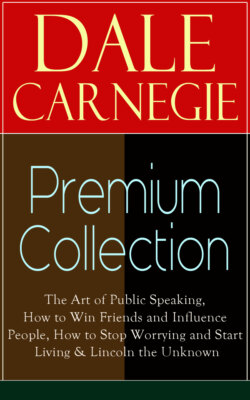Читать книгу DALE CARNEGIE Premium Collection - Dale Carnegie - Страница 74
На сайте Литреса книга снята с продажи.
QUESTIONS AND EXERCISES
Оглавление1. (a) What elements of appeal do you find in the following? (b) Is it too florid? (c) Is this style equally powerful today? (d) Are the sentences too long and involved for clearness and force?
Oh, gentlemen, am I this day only the counsel of my client? No, no; I am the advocate of humanity—of yourselves—your homes—your wives—your families—your little children. I am glad that this case exhibits such atrocity; unmarked as it is by any mitigatory feature, it may stop the frightful advance of this calamity; it will be met now, and marked with vengeance. If it be not, farewell to the virtues of your country; farewell to all confidence between man and man; farewell to that unsuspicious and reciprocal tenderness, without which marriage is but a consecrated curse. If oaths are to be violated, laws disregarded, friendship betrayed, humanity trampled, national and individual honor stained, and if a jury of fathers and of husbands will give such miscreancy a passport to their homes, and wives, and daughters,—farewell to all that yet remains of Ireland! But I will not cast such a doubt upon the character of my country. Against the sneer of the foe, and the skepticism of the foreigner, I will still point to the domestic virtues, that no perfidy could barter, and no bribery can purchase, that with a Roman usage, at once embellish and consecrate households, giving to the society of the hearth all the purity of the altar; that lingering alike in the palace and the cottage, are still to be found scattered over this land—the relic of what she was—the source perhaps of what she may be—the lone, the stately, and magnificent memorials, that rearing their majesty amid surrounding ruins, serve at once as the landmarks of the departed glory, and the models by which the future may be erected.
Preserve those virtues with a vestal fidelity; mark this day, by your verdict, your horror of their profanation; and believe me, when the hand which records that verdict shall be dust, and the tongue that asks it, traceless in the grave, many a happy home will bless its consequences, and many a mother teach her little child to hate the impious treason of adultery.
—Charles Phillips.
2. Analyze and criticise the forms of appeal used in the selections from Hoar, Story, and Kipling.
3. What is the type of persuasion used by Senator Thurston (page 50)?
4. Cite two examples each, from selections in this volume, in which speakers sought to be persuasive by securing the hearers' (a) sympathy for themselves; (b) sympathy with their subjects; (c) self-pity.
5. Make a short address using persuasion.
6. What other methods of persuasion than those here mentioned can you name?
7. Is it easier to persuade men to change their course of conduct than to persuade them to continue in a given course? Give examples to support your belief.
8. In how far are we justified in making an appeal to self-interest in order to lead men to adopt a given course?
9. Does the merit of the course have any bearing on the merit of the methods used?
10. Illustrate an unworthy method of using persuasion.
11. Deliver a short speech on the value of skill in persuasion.
12. Does effective persuasion always produce conviction?
13. Does conviction always result in action?
14. Is it fair for counsel to appeal to the emotions of a jury in a murder trial?
15. Ought the judge use persuasion in making his charge?
16. Say how self-consciousness may hinder the power of persuasion in a speaker.
17. Is emotion without words ever persuasive? If so, illustrate.
18. Might gestures without words be persuasive? If so, illustrate.
19. Has posture in a speaker anything to do with persuasion? Discuss.
20. Has voice? Discuss.
21. Has manner? Discuss.
22. What effect does personal magnetism have in producing conviction?
23. Discuss the relation of persuasion to (a) description; (b) narration; (c) exposition; (d) pure reason.
24. What is the effect of over-persuasion?
25. Make a short speech on the effect of the constant use of persuasion on the sincerity of the speaker himself.
26. Show by example how a general statement is not as persuasive as a concrete example illustrating the point being discussed.
27. Show by example how brevity is of value in persuasion.
28. Discuss the importance of avoiding an antagonistic attitude in persuasion.
29. What is the most persuasive passage you have found in the selections of this volume. On what do you base your decision?
30. Cite a persuasive passage from some other source. Read or recite it aloud.
31. Make a list of the emotional bases of appeal, grading them from low to high, according to your estimate.
32. Would circumstances make any difference in such grading? If so, give examples.
33. Deliver a short, passionate appeal to a jury, pleading for justice to a poor widow.
34. Deliver a short appeal to men to give up some evil way.
35. Criticise the structure of the sentence beginning with the last line of page 296.
